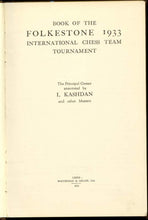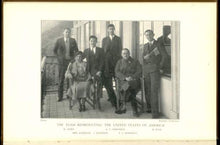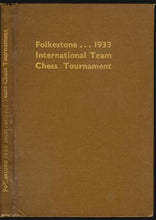Author: Kashdan, Isaac (1905-1985) [editor]
Year: 1933
Publisher: Whitehead & Miller
Place: Leeds
Description:
[7]+152 pages with frontispiece, diagrams, two tables and index. octavo (8 1/2" x 5 3/4") bound in original publisher's brown cloth with gilt lettering to spine and cover. Principle games annotated by I Kashdan and others. (Betts: 25-101) First edition.
The next Olympiad was scheduled to be held in Spain, 1932 but it was cancelled short before the start due to financial problems. Spain waited for their second chance until 2004, by the way. Another offer came from USA who wanted to host the event in Chicago. Since the idea of making chess one of disciplines of the Summer Olympic Games finally fell through there wasn't even a discussion about possible 1932 Los Angeles contest. The FIDE congress, the Olympiad and the Women World Championship commenced on June 12th opened by the Major of Folkestone. Despite of modest financial capabilities of BCF they organized the event games without reservation. 19 teams applied but Mexico, Spain and Argentina scratched and Estonia did not arrive. Estonia were, however, kept in the official cross-table and crossed off some time later.
USA, the titleholders were clear favorites. They had same core of the team as in 1931 but yet more experienced and well-trained. The rest was a mystery. Czechoslovakia lead again by top GM Salo Flohr were unanimously one of major favorites for a medal. Poland seemed strong as ever. Austria were reckoned to have good prospects though they were missing Spielmann this time. One might never forget about Sweden and Hungary, even considering their unsuccessful performance last time.
Unlike the Olympiads played so far the order of the teams was settled early in the run and altered very slightly. Team USA were dominant all over the field. The Americans took an early lead trashing some lower ranked teams without mercy. They were followed by Poland and Latvia who scored valuable 2-2 vs Czechoslovakia in the very first round. The latter, after leisure day were thrown down the middle of the table. USA convincingly wiped out Poland in round 4 and extended their lead since Latvia unexpectedly lost to France (no Matisons in Latvian squad this time so Alekhine had no problems). Lithuania lead by superb youngster Mikėnas beat Belgium 4-0 and took second place for a moment. Czechoslovakia picked up the speed and joined the chasing group (still with one extra match to play). Despite Flohr's tragic miniature lost to Mikėnas Czechoslovakia beat Lithuania in round 7 and finally went into the medal area way behind USA and a fraction behind firm Austrian team. The next round brought huge sensation as Czechoslovakia were demolished by Hungary, a team with young and brightly shining star Lilienthal in the squad. USA retained secure lead despite having a bye and Lithuania wasted huge chance to take back a lead of the chasing group having drawn to mediocre Iceland. After 9th round USA were in clear lead some 5 points ahead of the rest who were clustered in 1½ point range, namely Lithuania, Poland, Czechoslovakia, Austria, Hungary and Sweden. The Czechs recovered quickly crushing couple of weaker teams with ease and started dazzling pursuit trying to level the Americans who seemed a bit lazy and tired those days. Hungary took 3rd place with series of nice victories. Poland were down to 7th place. In 12th round USA wrote off Lithuanian hopes forever with unpleasant 4-0. Sweden was determined to fight for bronze and Czechoslovakia lost to France even though they were missing Alekhine on that day! His substitute, Betbeder Matibet beat Flohr with Black pieces anyway. Hungary lost both to Poland and USA but their hopes for a medal were still lengthened. In penultimate round USA suffered their first defeat in a match against desperate Swedish players. Czechoslovakia beat Poland and Hungary outscored Latvia by a huge margin.
A battle of giants was to come in the last round. Czechoslovakia needed a 3½-½ score to win the Championship and they were close to it. It seemed probable they would have won all four games but Treybal went too risky and lost the game and the gold medals for the Czechs. Sweden lost to Latvia and were caught by Hungary, who wasted their chances as well (a mere draw vs England), and Poland. However they won the bronze medals thanks to their Match Point record (21, vs 20 for Poland and 18 for Hungary). Austria, who had superior Match Point record to all above needed just a small win over Italy to secure themselves the medals but they lost two games and were classified down in 7th place, half a point behind the bronze medal winners. England were a bit disappointed seeing themselves in 10th place and Denmark once again were found at the bottom of the table. Unlike Prague Olympiad each team enjoyed at least one match win.
USA won without any doubts despite of their rather poor finish. Their top 4 played without any slip ups. Only substitute Simonson did not show his best. The pillar of the Czech team was most unexpectedly Opočenský who scored amazing 89% at board 4. Tragic loss vs Hungary did not demoralize them much and they were very close to a sensational triumph. Sweden failed to have a reserve player in their squad but Lundin won top prize for individual result at board 3 and the rest of the players scored over 50% without exception. Poland were not a disappointment although they missed a medal, something that never happened to them before. Regedziński, who was usually reliable member of the team felt badly due to specific, maritime climate at Folkestone. Havasi finally learned one should play chess also with Black pieces and did reasonably well. The strongest point of the Hungarian side was young Lilienthal. Austria were much disappointed, not only because of their last round failure. Grünfeld a teenager from Tirol Eliskases played very firm, but were definitely too much in a drawish mood, an ailment that has tormented the Austrian for a long time. Alekhine once again won gold medal for his individual score but since his team-mates were, to put it most mildly, in bad shape (famous painter Duchamp's individual score was 4th worst among all, superior only to three Scotsmen) French performance was average. The smallest of the Olympiads brought however many interesting games and solid background for future development of the Chess Olympiads, the most magnificent chess event ever invented.
142 fully annotated games with indexes of openings, and players. 1 USA; 2 Czechoslovakia; 3 Sweden. Includes results and one game from the women's world Championship. 1 Menchick.
Condition:
Extremities lightly rubbed, corners bumped, small light stain on front cover. A very good copy lacking jacket.
SOLD 2022





